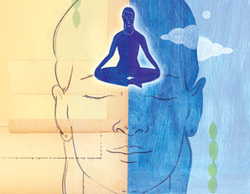 Meditation, meditation, meditation. It’s everywhere. Everyone is talking about it. You’ve heard them say how wonderful it is. You want to give it a try, but it seems a little mysterious and “out there” to you; and you don’t know where to begin, or why you even should. Let’s start with what it is. Meditation could be defined as a process: At first, it is the act of focused attention on a single subject. Eventually (and I do mean eventually), it is merging with the Infinite. You only need to be concerned with the first part, which is the discipline itself. Before you jump into the discipline, it is important to know why you are doing it. What are the benefits of meditation? Surely they are innumerable, and outcomes can be different for you than your friend who meditates. You are a unique soul that will receive unique benefits from your practice! There are, however, a few given benefits from a consistent meditation practice:
Does it sound worth it now? Excellent! Next month I’ll walk you through some steps and methods to support your meditation practice. In the meantime, explore some times of day that would work best for your meditation practice. Look into a space in your home that would serve as a spiritual refuge for you. Get ready to commit to your soul!  Lately there has been much talk about how busy a society we are, the evils of technology, and what a shame it is that we connect online more than in person. Yet there is another practice that is emerging simultaneously with our busyness: Realizing the importance of taking time away from it all! Meditation, yoga, sitting by the beach, and other forms of quiet time are finding their way into many people’s routine. Sometimes clients share their involved story with me, then say, “I just don’t feel I am handling it well.” In most cases, they are handling the situation beautifully, but forgetting to handle themselves as conscientiously as they are the other people and events. I will gently reflect that perhaps instead of needing to do more, it is time to do less, to take time apart from the situation and renew themselves. What are some ways you renew yourself? Having a list of three or four things can help your renewal time feel fresh. Other people like their standby of one or two activities (or inactivities!). Taking a walk, listening to music, relaxing in a hammock, reading a book are other ways to take a vacation from busyness for a while. I love riding my bike around a lake near our house. Biking has always been a refreshing activity for me—feeling the wind cooling me as I ride, looking at natural surroundings or pretty neighborhoods, and enjoying the exercise-induced invigoration when I’m done. My favorite trail is in Busse Woods, passing the elk as I ride; but even shorter rides near home can feel like I was gone for hours! If these activities still seem too time-consuming in your busy day, try taking two minutes two or three times throughout your day to breathe. Stop what you are doing and do some diaphragmatic breathing—breathing from your belly—in and out for two minutes. Try it right now…Refreshing, right? There is always time to take time apart--and there is always the need to do so!  Change happens. Sometimes we change because we want to; sometimes we change because we have to. When dealing with a change that is out of our control, one of the best approaches is to Sherlock it. “My name is Sherlock Holmes. It is my business to know what other people don’t know.” Sherlock Holmes, The Adventure of the Blue Carbuncle You know Sherlock. He’s the odd, people-challenged character who sure knew how to solve mysteries. Don’t some changes feel like mysteries to you? Recently, my favorite yogurt brand changed the consistency, flavor and protein content of their product, and I wasn’t happy! I will use this silly example to walk you through the process of moving through a change that is out of your control so you can get a feel for the process. If it can work with yogurt, maybe it will transfer to any bigger change you may be dealing with! “…[W]hen a fact appears to be opposed to a long train of deductions it invariably proves to be capable of bearing some other interpretation.” Sherlock Holmes, A Study in Scarlet 1. What is the change that is happening around you? Describe the facts. What exactly is different? This company changed the protein content of my favorite yogurt went from 15 grams of protein down to 12! Plus, the consistency is more watery, and the flavor tastes watered down as well, but it’s cheaper! 2. Now you get to expand a little. How do you feel about this change? Are you angry, afraid, sad, or frustrated? Let it out, and include why you are feeling the way you do about this change. I feel really disappointed about this. I counted on those 15 grams of protein in the mornings when I didn’t have time for a larger breakfast. I would eat it at work as well, but now it isn’t satisfying as it was before. I don’t understand why they made these changes, and I feel angry. I feel especially frustrated because the only other comparable yogurt is at a grocery store that is inconveniently located! 3. What about this change is in your control? What about it is out of your control? (Keep to the facts here, too!) I can control whether or not I continue to purchase this brand of yogurt. I don’t have control over how it is made. I can write an email to the company, voicing my dissatisfaction, but I can’t control whether or not they do anything about my dissatisfaction, either. 4. What would be the best way for you to manage this change? What steps are you willing to take to make the necessary adjustments? I can consider other options, such as trying a different brand of yogurt, or making the trek to the other grocery store. I can also find other sources of quick proteins for my food intake needs, like protein bars. “Eliminate all other factors, and the one which remains must be the truth.” Sherlock Holmes, The Sign of Four Now it’s up to you what you decide to do. You can always choose to continue with emotional responses, such as disappointment, anger, frustration, sadness. If that’s the route you take, be sure to also answer this question: “For what good purpose would it serve for me to continue feeling (frustrated, sad, angry, hurt, etc) about this change?” That can be an eye-opener, and can lead to your choosing not to hold on to that reaction any longer than you need to. “What object is served by this circle of misery and violence and fear? It must tend to some end, or else our universe is ruled by chance, which is unthinkable.” Sherlock Holmes, The Cardboard Box When you have completed the process and made your adjustments, kick back like Sherlock (or perhaps in your own, healthier way) and feel good about solving the mystery of change. “Let me run over the principal steps. We approached the case, you remember, with an absolutely blank mind, which is always an advantage. We had formed no theories. We were simply there to observe and to draw inferences from our observations.” Sherlock Holmes, The Adventure of the Cardboard Box  Since the transition into the new year, there have been many scientific revelations around the practice of mindfulness meditation. Mindfulness is focused attention, the observing of sensations and thoughts without getting caught up in them. Often the breath is the focus of mindfulness meditation, and yoga is an example of mindfulness practice. Meditators and yoga lovers have known the power of focused attention, stillness and breath awareness for a long time—thousands of years, even. Through many recent brain scans studies, science now acknowledges several physiological benefits of taking just five minutes every day to pay attention to the breath:
Convinced like a scientist yet? So, where to begin? All you need in your busy schedule is five minutes. Try to pick the same time each day so it becomes part of your daily routine. Think of it as necessary as brushing your teeth, except you are “brushing” away stress from your brain! Sit comfortably. Begin taking normal breaths. Make sure you are breathing from your diaphragm (“belly breathing”) rather than your lungs only (“chest breathing”). Rest your hand above the stomach and below the ribs, which is where your diaphragm is approximately located. As you breathe normally from your diaphragm, you will feel your belly rise as you inhale, and retract as you exhale. Continue for five minutes. If you find your mind wandering (which you will!) during this time, gently bring your attention back to your breathe. Notice any sensations in your body, but do not let your mind have a conversation about them. Simply bring your attention back to your breathe. Notice sounds around you, but again, don’t let your thoughts go on about them. Let your belly breathing be your primary focus. Keep a journal of the changes you notice over time. People have told me that their doctors asked them why their blood pressure was lower than their last check up. Others have noticed emotional equilibrium that wasn’t there before they began practicing. Others appreciate the sense of overall peace throughout their day. What benefits are coming to you through your practice? Further reading:
"'Mindfulness' Meditation Alters Gene Expression, Study Suggests", The Huffington Post | By Jacqueline Howard Posted: 12/09/2013 7:53 am EST | Updated: 01/19/2014 11:49 pm EST "The science behind meditation, and why it makes you feel better", GEORGE DVORSKY on IO9NEUROSCIENCE 4/04/13 11:28a "The Power of Concentration", By Maria Konnikova, Published: December 15, 2012  Every summer at our house, we go through the entire house, top to bottom, and get rid of things that are no longer necessary to us. The kids go through their toys, papers, dvds, clothing--everything! And we do the same. When we are done, our home is lighter and delightfully decluttered! Then we are better able to tackle the daily clutter more easily. Did you know we have to declutter our consciousness, too? We certainly do! There are things coming up every day for us to look at, understand, forgive and release! As we do this decluttering, we are lighter on the inside and better able to make choices that are clear and support us. Here are five tools for your inner de-cluttering that you can use daily, and enjoy the fresh air that peace of mind brings! 1. Meditate. For five minutes a day (at a consistent time and location), observe the thoughts that go through your mind. Don’t push them away, judge them, or feel ashamed; just notice what they are saying to you and let them pass. 2. Journal. Write about the time during the day when you felt frustrated, hurt, sad or angry. What were you feeling and thinking? Get to know your reactions and look for a pattern in them. Writing about your feelings can help you understand when to back off, and when to stand up for yourself. 3. Forgive. Jane Elizabeth Hart’s Seven Steps for Successful Life Transitions is an excellent forgiveness method. Unforgiveness balls you up in body, mind and expression, while forgiveness frees you to experience more overall joy. 4. Use difficult people to learn about your hidden issues. Take that guy at the office that grinds you like fingers down a chalkboard. Get your journal and list all the qualities and behaviors about him that bug you. Ask yourself who this person represents to you. You can learn a lot about what is blocking you from your potential by embracing those you find difficult to be around. Forgive them even if you don’t know what it is that you don’t like. The health benefits of this action alone will be worth your effort. 5. Trust yourself above all others. The best spiritual teachers out there will encourage you to listen to your own inner promptings. As you watch your own thinking and journal out your feelings, you will begin to understand more about who you are. This is a wonderful and scary thing! Trust that your inner wisdom will reveal itself and support you as you work to resolve fear and false beliefs.  Sad news for all of us multitaskers out there: We’re not as effective as we think we are. Recently on NPR’s Science Friday, Clifford Nass, professor of communication at Stanford University, discussed the benefits of multitasking. Bottomline: There aren’t any. Here are some interesting highlights from the interview:
Here’s the interesting part: Nass says, “The research is almost unanimous…people who chronically multitask show an enormous range of deficits. They're basically terrible at all sorts of cognitive tasks, including multitasking…People who multitask all the time can't filter out irrelevancy. They can't manage a working memory. They're chronically distracted. They initiate much larger parts of their brain that are irrelevant to the task at hand. And they're even terrible at multitasking. When we ask them to multitask, they're actually worse at it. So they're pretty much mental wrecks.” So, once we convince ourselves that this is indeed true, what can we do to support ourselves being effective and present? Mindfulness meditation, a Westernized form of Zen Buddhist meditation, has been shown to help focus, memory and the ability to handle multiple jobs at once. One study showed that people trained in mindfulness meditation, versus those in the study who weren’t, stayed on tasks longer and made fewer switches between tasks, as well as experiencing less negative emotion when they were done. Improved memory was an additional benefit to those in the meditating groups. Here's what you can to for your own multitask recovery: Take 15 minutes each day to still your mind. Even if you don’t feel successful, you will be making great progress in retraining your mind to focus, concentrate and listen for divine ideas. Anything you do for those 15 minutes that allows you to think of as few things as possible will benefit your practice. You can listen to music and try to focus on the sounds rather than thoughts. You could watch a candle flame, focusing on the dancing flame instead of the many thoughts going through your mind. Some people like to listen to a guided meditation and follow along with the visualization. Other people like to use a mantra or affirmation that gives them a single idea upon which to focus. There is no wrong way to do it, as long as you find something that allows you to be as still as possible. Turn off Facebook, email, talk radio, television and your busy mind; and gain the benefits of focus and being present with yourself!  There is a fun song on the internet called “You Are a Pirate. The words are, “Do what you want ‘cause a pirate is free / You are a pirate / Yar-har-fiddle-de-dee / Being a pirate is alright with me / Do what you want ‘cause a pirate is free / You are a pirate” then repeat, continuous loop-style, ad nauseum. The song originally comes from a children’s television program in which the town villain disguises himself as a pirate to lure the children away from their good behavior. He makes being a pirate sound fun with his happy pirate song and promises of freedom from discipline and rules. The children, of course, enthusiastically take their places as his crew mates. Who doesn’t want freedom? On the spiritual path, one of the skills we learn is distinguishing between short-sighted egoic impulses and the true promptings of our soul. We start learning this by more closely observing the thoughts and feelings that arise and incite us to act. When our ego pulls us toward personality freedom, often it can excite us and feel good on a short-term basis. Ego pulls don’t take into consideration the needs of those around us or long-term consequences of our actions. We can liken this to the pirate from the song, and the children who happily followed along. Soul freedom leads us toward greater responsibility for what is ours to do this lifetime. It also aligns us with our higher potential. Hmm…Not as enticing at first, is it? Paramahansa Yogananda, the great Indian mystic, once said, “The mind is so powerful, it can make you taste salt and think it is sugar, and when you eat sugar, it can make you think you taste salt.” Our ego pulls are the salt that tastes sweet at first, but then we feel disappointed when we discover it wasn’t what was in our best interest. Our soul promptings taste a bit salty at first, but as we stick with them, how sweet it is! Everything flows better when we are aligned with our soul responsibilities! How much time and energy do you spend following the piratey impulsiveness of your personality self? How long does that satisfy you? The children who followed the pirate to his false “freedom” (and were subsequently captured) quickly learned that the rules they ran from actually provided structure so they could play more freely! Likewise, our intuition is there to help us learn the best structure and steps to take to free our souls from ego-captivity, allowing greater energy to flow into a more joyful expression of who we truly are! Do smokers have the right idea?
Note: This article is in no way intending to encourage smoking. Smoking is hazardous to your physical health in many ways. It also tends to cover up emotional issues, instead of dealing with them head on in healthier ways. That said, let’s look at some of the Buddhist-like ways that smokers handle their day… While introducing a mindfulness breathing exercise to a client, she brought to my attention how smokers do “that breathing” all throughout the day. Well, you know, aside from the nicotine addiction and what they are putting their lungs through one breath at a time…They are committed to some serious mindful practices at regular intervals: 1. Take a break from the day’s agenda, or walk away from a stressful situation 2. Inhale deeply, to the count of five 3. Hold your breath for the count of three 4. Exhale to the count of five 5. Repeat for, oh, about five minutes Taking five minutes a day, several times each day, to breathe and focus can make a huge difference to your attitude, serenity and attention. Step out of your agenda, away from a stressful situation. Breathe. Listen to your breathing. Observe it going in. Observe it going out. Focus on your breath rather than on what you just left or have waiting for you. Note how calm you feel as you return to your activities: Lighter, clearer, more alert. Don’t smoke. Do breathe.  Mindfulness, a form of meditation derived from Zen Buddhism, is quickly becoming a popular form of therapy. Being present with your thoughts, without action or judgment, is a quick way to learn what thoughts are going through your head, to disconnect from those thoughts as reality, and to be able to make new, objective decisions and actions based on observation rather than emotion or automatic, knee-jerk reactions to life situations. Take this simple exercise: Sit in a comfortable position. Breathing from your diaphragm at a natural rate, begin counting each breath, with your first inhalation as “one” and your first exhalation as “two,” and so forth all the way to the count of ten. Each in breath will be an odd number, each outbreath will be an even number. When you reach ten, start over, and continue this for two or three minutes. If your mind wanders, just bring your focus back to your breathing and counting. Notice how you feel at the end of the exercise. Do you feel more peaceful? Do you feel energized? Do you feel more relaxed? It is amazing what a vacation from our thinking will do for us! By learning to observe and manage your own thoughts, you begin to understand the automatic nature of patterns that repeat themselves in your life. Once you are aware of a pattern, you can choose a new response that may give you the better result you have been hoping for. Try out the mindfulness exercise, and let me know how it worked for you! |
Archives
April 2016
AuthorLynn Barrette, LCSW Blending psychology with spirituality, I offer tools for forgiveness, acceptance, meditation and relaxation, and positive parenting solutions. Categories
All
Archives
April 2016
|


 RSS Feed
RSS Feed